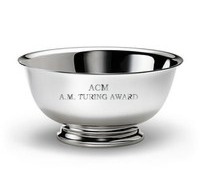| Authors of the Dragon Book Win 2020 Turing Award |
| Written by Sue Gee | |||
| Wednesday, 31 March 2021 | |||
|
Alfred Aho and Jeffrey Ullman are the recipients of the 2020 ACM A.M. Turing Award. Considered to be the Nobel Prize of computing, this annual award is worth $1 million and recognizes significant fundamental contributions to computing.
Established in 1966, the award was named to honor Alan M. Turing and is the most prestigious of those made by the ACM (Association for Computing Machinery). The citation in respect of Alfred Vaino Aho and Jeffrey David Ullman reads: For fundamental algorithms and theory underlying programming language implementation and for synthesizing these results and those of others in their highly influential books, which educated generations of computer scientists. At the present time Aho is the Lawrence Gussman Professor Emeritus of Computer Science at Columbia University while Ullman is the Stanford W. Ascherman Professor Emeritus of Computer Science at Stanford University. Commenting on the award, ACM President Gabriele Kotsis stated: “The practice of computer programming and the development of increasingly advanced software systems underpin almost all of the technological transformations we have experienced in society over the last five decades. While countless researchers and practitioners have contributed to these technologies, the work of Aho and Ullman has been especially influential. They have helped us to understand the theoretical foundations of algorithms and to chart the course for research and practice in compilers and programming language design. Aho and Ullman have been thought leaders since the early 1970s, and their work has guided generations of programmers and researchers up to the present day.” Aho and Ullman met while while waiting in the registration line on their first day of graduate school at Princeton University in 1963. Having earned their PhD degrees they both joined Bell Labs, where they worked together from 1967 to 1969 with their early achievements included developing efficient algorithms for analyzing and translating programming languages. In 1969, Ullman moved into academia, ultimately joining the faculty at Stanford University, while Aho remained at Bell Labs for 30 years before joining the faculty at Columbia University. However they continued to collaborate and co-authored books and papers and introduced novel techniques for algorithms, programming languages, compilers and software systems.
Their first seminal work, co-authored with John Hopcraft was The Design and Analysis of Computer Algorithms (1974). Considered a classic in the field and was one of the most cited books in computer science research for more than a decade and became the standard textbook for algorithms courses throughout the world when computer science was still an emerging field. As well as covering the algorithms they had pioneered this book introduced the random access machine (RAM) as the basic model for analyzing the time and space complexity of computer algorithms using recurrence relations. The RAM model and general algorithm design techniques introduced in this book now form an integral part of the standard computer science curriculum. Even better known is Principles of Compiler Design (1977) and its successors, known as the Dragon Book because of its cover design. As the definitive book on compiler technology it lays out the phases in translating a high-level programming language to machine code, modularizing the entire enterprise of compiler construction and includes algorithmic contributions that the authors made to efficient techniques for lexical analysis, syntax analysis techniques, and code generation. The book also contains the entire code for making a compiler. The original is sometimes called the "green dragon book" to distinguish it from its 1988 successor, co-authored with Ravi Sethi Compilers: Principles, Techniques, and Tools, aka the "red dragon book". Its second revised and updated edition, was published in 2006 added a fourth author, Monica S. Lam, and the dragon became purple; hence becoming the "purple dragon book." Although lacking a dragon cover, the 2013 edition of this book is still current. The Turing Award is funded by Google and Jeff Dean, Google Senior Fellow and SVP, Google AI, noted: “Aho and Ullman established bedrock ideas about algorithms, formal languages, compilers and databases, which were instrumental in the development of today’s programming and software landscape. They have also illustrated how these various disciplines are closely interconnected. Aho and Ullman introduced key technical concepts, including specific algorithms, that have been essential. In terms of computer science education, their textbooks have been the gold standard for training students, researchers, and practitioners.”
More InformationRelated ArticlesCompilers, Interpreters, VMs and JIT Computer Graphics Pioneers Win 2019 Turing Award Hinton, LeCun and Bengio Receive 2018 Turing Award RISC Pioneers Gain Turing Award Turing Award Now Million Dollar Prize ACM Celebrates 50 Years of Turing Award Tim Berners-Lee Awarded Turing Prize Diffie and Hellman Receive Turing Award Ivan Sutherland - Father of Computer Graphics Ivan Sutherland Wins Frontiers of Knowledge Award To be informed about new articles on I Programmer, sign up for our weekly newsletter, subscribe to the RSS feed and follow us on Twitter, Facebook or Linkedin.
Comments
or email your comment to: comments@i-programmer.info
<ASIN:1292024348> <ASIN:0321486811>
|
|||
| Last Updated ( Friday, 01 April 2022 ) |





